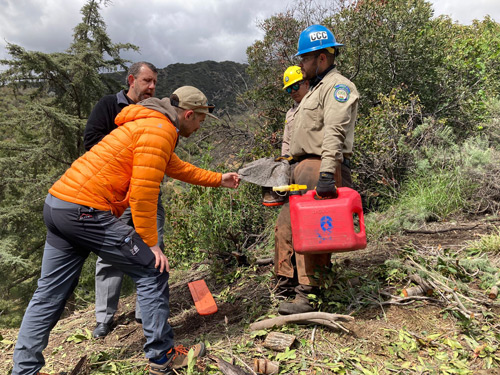
Erika Spagakou
CO-Founder
Ecogenia Co-founder, Erika Spagakou, takes a moment to reflect during a critical inflection point during Greece’s 2023 wildfire season
August 24, 2023. It’s Thursday morning. Lia and I are in Athens working together this week, planning out our milestones for the year ahead. 2024 is shaping up to be a pivotal year for Ecogenia; having piloted for two years now, we feel confident in the lessons we have learned, committed to investing more in advocacy to make the case for civic service legislation, and certain that our proposed model of youth development and active citizenship can bring transformative change for Greece.
9am. We meet outside the office. We have set our goals for the day; brainstorming our program culture further and back-planning some of this year’s programmatic activities as we scale our work in disaster management. But when we both arrive at the meeting point and our looks cross, we immediately know our minds are preoccupied with something else and the day might take a different course. Lia is wearing her glasses. I never see her in her glasses.
- What happened to your contacts?
- My eyes are sore from the particles in the air. I couldn’t put them on.
- Right? My eyes have also been killing me this morning. How are you otherwise?
- It will be hard to focus today, that’s for sure. We are literally breathing climate change right now.
- I hear you. I could not sleep last night.
This summer, yet again, Greeks were faced with what seems to be the new order of things. Wildfires raging across the country, topped with outdated and uncoordinated resources to fight them, lack of long-term planning, a society unprepared to manage disasters and a civil discourse that is tired, and at times dangerous.
Eco-anxiety is no longer a concept for academic books but what happens when you have to go to work in a city that is literally burning. The sound of birds has given way to deafening mobile notifications from Civil Protection, and wildfire season is the new summer. This is NOT OK.
We are feeling humbled and thankful for all the heroes on the frontlines, firefighters and volunteers who are throwing themselves in the fire to save what they can.
No matter who or how the fires started throughout this summer, climate change is both the real cause and the aftermath of this disaster. Being consumed in the analysis of how and what happened is undoubtedly an important exercise, but more importantly, thinking about how to change the circumstances that allowed it to happen in the first place, seems like a more productive and ripe place to start. Why is the land so easy to catch on fire and what could we have done differently to protect it? Could we do a better job at patrolling our national parks and forests, and how can we invest more in prevention, preparedness and coordinated relief efforts?
We feel heartbroken, frustrated but determined. It is clear – we need a systems-approach to addressing the existential crisis of our time. We know that we cannot control the heat waves and the winds. But what we can do is, train people and work with communities to increase readiness for disaster management, so that response is faster when disaster inevitably strikes. What we can do is, better coordinate the cleaning of the land of all the flammable matter that causes the fire to spread so fast, often in the opposite direction of the wind. What we can do is, patrol our parks, train citizens to clean their own plots and train more volunteers on how to support firefighters on the frontlines.
When Lia and I started building Ecogenia, we knew that bringing civic service to Greece was important. But what we were adamant about was that it had to be catering to the climate emergency. Creating active citizens is a movement; creating active climate citizens has now become a necessity. And as we stand in the middle of a burning city, and dream of a better future for Greek youth, we know in our hearts that giving them an active role in managing natural disasters and environmental crises is the key to our collective success.
We are very fortunate to have the roadmaps for activating youth in disaster management. In February 2022 we were hosted by the California Conservation Corps (CCC) for a week, and our team had the opportunity to witness first-hand how youth is leveraged to support the creation of fire protection zones for prevention, how rigidly they are trained to support firefighters on the frontlines of response, and how they are activated to support communities in the aftermath of disasters for relief. An impact-chain that has citizens embedded at every step of the way.


This spring we are set to continue learning from the CCC, as they have generously committed to bringing a team of 8 corps members and their staff to Greece to work with our team in piloting our disaster management program, and continuing our capacity building efforts. As Lia and I go back to our brainstorming board, the momentum could not be more ripe to be showcasing the immense potential for citizens to complement national environmental protection efforts. It is high time, we move away from frustration and focus on what solutions we can invest in. Yes, we ought to hold those at fault accountable, but beyond that, we could benefit from flipping the narrative on its head and thinking about how we can take matters in our own hands to accelerate some of the solutions.
Pragmatic and tangible optimism. This is what the times call for. And action is, after all, the antidote to despair.

